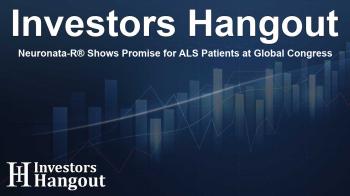Neuronata-R® Shows Promise for ALS Patients at Global Congress

Neuronata-R® Shows Promise for ALS Patients
CorestemChemon Inc. recently unveiled significant findings on Neuronata-R® (lenzumestrocel), a breakthrough treatment aimed at amyotrophic lateral sclerosis (ALS), during a notable presentation at a global congress. The results were detailed at the PACTALS 2025 congress, emphasizing the exciting prospects of stem cell therapy in managing ALS.
Key Findings from the Clinical Trials
The Phase 3 ALSummit trial showcased how Neuronata-R® can potentially impact patients with slower disease progression. The results revealed that while the overall trial did not meet its primary endpoints, specific patient subgroups reported statistically significant improvements.
Subgroup Analysis Highlights
This subgroup analysis shed light on the efficacy of Neuronata-R® in providing treatment benefits for patients progressing more slowly in their disease timeline. At the notable 12-month mark, patients receiving Neuronata-R® experienced:
- ALSFRS-R (functional rating scale): A score of 31.2 compared to 26.4 in the placebo group (p=0.001)
- CAFS (Combined Assessment of Function and Survival): Reporting 20.95 vs. 17.92 in placebo (p=0.024; p=0.041)
- SVC (slow vital capacity): 62.2% efficacy in comparison to 50.6% with placebo (p=0.017)
Such findings suggest that Neuronata-R® may significantly support functional abilities and respiratory capacity among ALS patients, crucial indicators of their overall quality of life.
The Role of Biomarkers in Treatment Efficacy
Another exciting aspect of the trial focused on biomarker data, indicating substantial reductions in neurofilament light chain (NfL) and MCP-1. These indicators revealed a strong connection between neuroprotection and beneficial clinical outcomes, emphasizing the importance of biomarker-guided patient stratification in ALS.
Regulatory Steps Toward Approval
The results presented at PACTALS 2025 mark a pivotal moment in the regulatory journey for CorestemChemon. The company has plans to engage in discussions with the U.S. Food and Drug Administration (FDA) through a Type-C meeting scheduled for later in the year. This meeting aims to evaluate the implications of the trial results and explore the potential for accelerated approval.
If all goes well, CorestemChemon anticipates submitting a Biologics License Application (BLA) as early as 2026, aspiring to move forward with a pathway that aligns with historical precedents in ALS treatment.
Mechanism of Action: How Neuronata-R® Works
Neuronata-R® stands out as a promising stem cell treatment for ALS, utilizing autologous mesenchymal stem cells (MSCs) derived from a patient's own bone marrow. This specialized therapy is designed to mitigate inflammation, protect motor neurons, and modulate the body's immune response.
The precise mechanisms involve the secretion of various growth factors and cytokines, which work together to create a supportive microenvironment for neuronal health. By addressing the underlying causes of ALS, Neuronata-R® aims to disrupt the progressive cycle of neurodegeneration.
CorestemChemon: A Leader in ALS Research
Founded on a decade-long commitment to ALS research, CorestemChemon has made significant strides in developing Neuronata-R®. The therapy has been available in more than 400 commercial cases and extensive clinical trials, reassuringly demonstrating safety with no serious treatment-related adverse events.
Conclusion: A Hopeful Future for ALS Treatment
The recent findings affirm CorestemChemon's commitment to innovative solutions in ALS therapy. With robust clinical data supporting Neuronata-R®, the potential for regulatory approval presents a hopeful horizon for ALS patients
Frequently Asked Questions
What is Neuronata-R®?
Neuronata-R® (lenzumestrocel) is an autologous stem cell therapy developed to treat ALS, derived from a patient’s own bone marrow.
What were the significant trial results for Neuronata-R®?
Subgroup analyses showed statistically significant improvements in functional scores and respiratory function for patients receiving Neuronata-R® compared to placebo.
How does Neuronata-R® work?
The therapy utilizes mesenchymal stem cells to address inflammation, protect motor neurons, and promote a healthier neuronal microenvironment.
What are the next steps for CorestemChemon regarding FDA approval?
CorestemChemon intends to request a Type-C meeting with the FDA to discuss trial results and potential regulatory pathways in the near future.
What is the significance of biomarkers in ALS treatment?
Biomarkers help predict treatment efficacy and patient stratification, allowing a more personalized approach to ALS therapy.
About The Author
Contact Ryan Hughes privately here. Or send an email with ATTN: Ryan Hughes as the subject to contact@investorshangout.com.
About Investors Hangout
Investors Hangout is a leading online stock forum for financial discussion and learning, offering a wide range of free tools and resources. It draws in traders of all levels, who exchange market knowledge, investigate trading tactics, and keep an eye on industry developments in real time. Featuring financial articles, stock message boards, quotes, charts, company profiles, and live news updates. Through cooperative learning and a wealth of informational resources, it helps users from novices creating their first portfolios to experts honing their techniques. Join Investors Hangout today: https://investorshangout.com/
The content of this article is based on factual, publicly available information and does not represent legal, financial, or investment advice. Investors Hangout does not offer financial advice, and the author is not a licensed financial advisor. Consult a qualified advisor before making any financial or investment decisions based on this article. This article should not be considered advice to purchase, sell, or hold any securities or other investments. If any of the material provided here is inaccurate, please contact us for corrections.

